动词不定式用法与专项练习讲课教案
- 格式:doc
- 大小:58.50 KB
- 文档页数:9
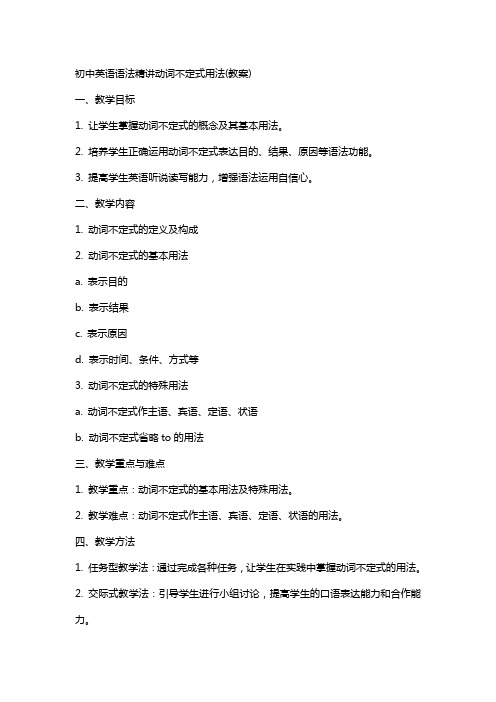
初中英语语法精讲动词不定式用法(教案)一、教学目标1. 让学生掌握动词不定式的概念及其基本用法。
2. 培养学生正确运用动词不定式表达目的、结果、原因等语法功能。
3. 提高学生英语听说读写能力,增强语法运用自信心。
二、教学内容1. 动词不定式的定义及构成2. 动词不定式的基本用法a. 表示目的b. 表示结果c. 表示原因d. 表示时间、条件、方式等3. 动词不定式的特殊用法a. 动词不定式作主语、宾语、定语、状语b. 动词不定式省略to的用法三、教学重点与难点1. 教学重点:动词不定式的基本用法及特殊用法。
2. 教学难点:动词不定式作主语、宾语、定语、状语的用法。
四、教学方法1. 任务型教学法:通过完成各种任务,让学生在实践中掌握动词不定式的用法。
2. 交际式教学法:引导学生进行小组讨论,提高学生的口语表达能力和合作能力。
3. 直观教学法:利用图片、例句等直观手段,帮助学生理解和记忆动词不定式的用法。
五、教学步骤1. 引入:通过一个谜语引导学生猜测动词不定式的概念。
2. 讲解:讲解动词不定式的定义、构成及基本用法。
3. 练习:让学生进行动词不定式填空练习,巩固所学知识。
4. 拓展:介绍动词不定式的特殊用法,如省略to的用法。
6. 作业布置:布置相关练习题,让学生课后巩固所学知识。
7. 课后反思:对本节课的教学效果进行反思,为下一步教学做好准备。
六、教学评估1. 课堂参与度:观察学生在课堂活动中的积极参与程度,以及他们的兴趣和动机。
2. 口语表达:评估学生在小组讨论和角色扮演中使用动词不定式的能力。
3. 练习完成情况:检查学生完成练习的情况,包括正确性和准确性。
4. 作业提交:评估学生作业的完成质量,包括对动词不定式的理解和应用。
七、教学拓展1. 动词不定式与现在分词的比较:讲解两者在表示动作进行时的区别。
2. 动词不定式与过去分词的比较:讲解两者在表示被动语态时的区别。
3. 动词不定式与形容词的比较:讲解两者在修饰名词时的用法差异。
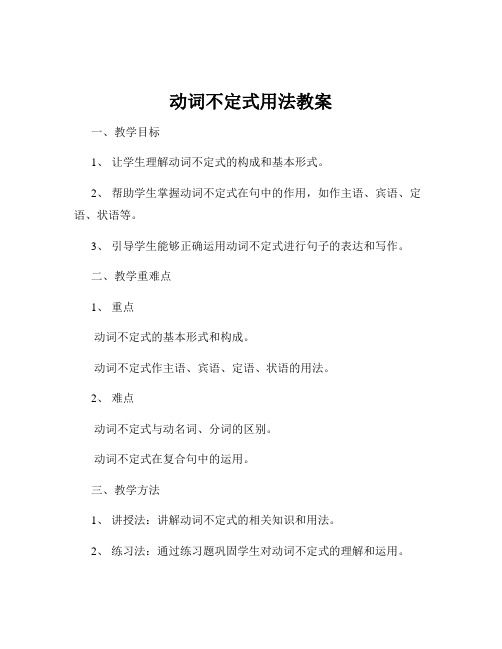
动词不定式用法教案一、教学目标1、让学生理解动词不定式的构成和基本形式。
2、帮助学生掌握动词不定式在句中的作用,如作主语、宾语、定语、状语等。
3、引导学生能够正确运用动词不定式进行句子的表达和写作。
二、教学重难点1、重点动词不定式的基本形式和构成。
动词不定式作主语、宾语、定语、状语的用法。
2、难点动词不定式与动名词、分词的区别。
动词不定式在复合句中的运用。
三、教学方法1、讲授法:讲解动词不定式的相关知识和用法。
2、练习法:通过练习题巩固学生对动词不定式的理解和运用。
3、讨论法:组织学生讨论动词不定式在句子中的作用,促进学生的思考和交流。
四、教学过程1、导入通过展示一些包含动词不定式的句子,如“To learn English well is important”“He wants to go shopping”等,引导学生观察这些句子的特点,引出动词不定式的概念。
2、知识讲解(1)动词不定式的构成动词不定式由“to +动词原形”构成,其中“to”是动词不定式的符号,有时可以省略。
例如:“I want to see a movie”中的“to see”就是动词不定式。
(2)动词不定式在句中的作用①作主语动词不定式作主语时,通常位于句首,但常用 it 作形式主语,将真正的主语动词不定式后置。
例如:“To swim in the river is dangerous”可以转换为“It is dangerous to swim in the river”②作宾语常见的动词如 want, hope, decide, plan, agree 等后常接动词不定式作宾语。
例如:“She decides to study harder”③作定语动词不定式作定语时,通常放在被修饰的名词或代词之后。
例如:“I have a lot of work to do”④作状语动词不定式可以作目的状语、结果状语等。
例如:“He came here to see me”(目的状语)“He is too young to go to school”(结果状语)3、练习巩固(1)给出一些句子,让学生判断动词不定式在句中作什么成分。
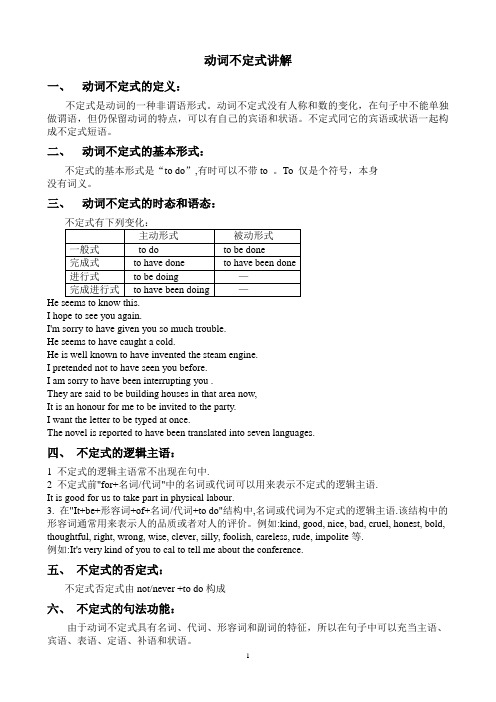
动词不定式讲解一、动词不定式的定义:不定式是动词的一种非谓语形式。
动词不定式没有人称和数的变化,在句子中不能单独做谓语,但仍保留动词的特点,可以有自己的宾语和状语。
不定式同它的宾语或状语一起构成不定式短语。
二、动词不定式的基本形式:不定式的基本形式是“to do”,有时可以不带to 。
To 仅是个符号,本身没有词义。
三、动词不定式的时态和语态:I hope to see you again.I'm sorry to have given you so much trouble.He seems to have caught a cold.He is well known to have invented the steam engine.I pretended not to have seen you before.I am sorry to have been interrupting you .They are said to be building houses in that area now,It is an honour for me to be invited to the party.I want the letter to be typed at once.The novel is reported to have been translated into seven languages.四、不定式的逻辑主语:1 不定式的逻辑主语常不出现在句中.2 不定式前"for+名词/代词"中的名词或代词可以用来表示不定式的逻辑主语.It is good for us to take part in physical labour.3. 在"It+be+形容词+of+名词/代词+to do"结构中,名词或代词为不定式的逻辑主语.该结构中的形容词通常用来表示人的品质或者对人的评价。
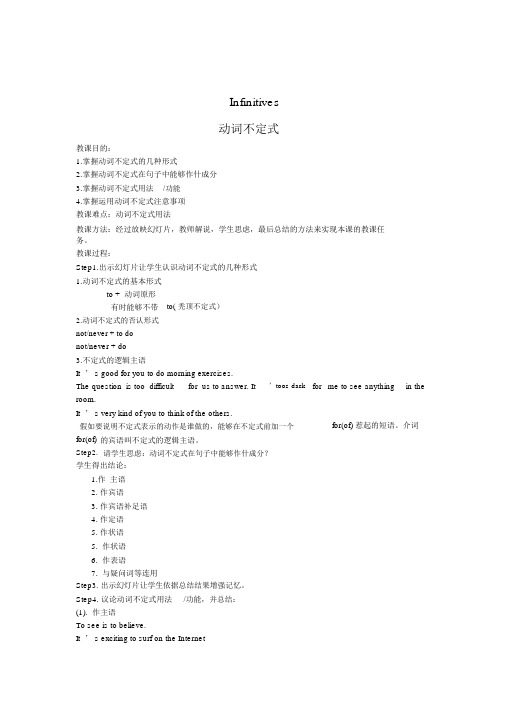
Infinitives动词不定式教课目的:1.掌握动词不定式的几种形式2.掌握动词不定式在句子中能够作什成分3.掌握动词不定式用法/功能4.掌握运用动词不定式注意事项教课难点:动词不定式用法教课方法:经过放映幻灯片,教师解说,学生思虑,最后总结的方法来实现本课的教课任务。
教课过程:Step1.出示幻灯片让学生认识动词不定式的几种形式1.动词不定式的基本形式to + 动词原形有时能够不带2.动词不定式的否认形式to( 秃顶不定式)not/never + to donot/never + do3.不定式的逻辑主语It ’ s good for you to do morning exercises.The question is too difficult for us to answer. Itroom.It ’ s very kind of you to think of the others.’toos dark for me to see anything in the 假如要说明不定式表示的动作是谁做的,能够在不定式前加一个for(of) 惹起的短语。
介词for(of) Step2.的宾语叫不定式的逻辑主语。
请学生思虑:动词不定式在句子中能够作什成分?学生得出结论:1.作主语2. 作宾语3. 作宾语补足语4. 作定语5. 作状语5.作状语6.作表语7.与疑问词等连用Step3. 出示幻灯片让学生依据总结结果增强记忆。
Step4. 议论动词不定式用法/功能,并总结:(1). 作主语To see is to believe.It ’ s exciting to surf on the Internet作主语的不定式假如很短,往常位于句首;若不定式(短语)较长时,常用 it 作形式主语,而把真实的主语(即动词不定式)放在后边以防止虎头蛇尾。
(2) 宾语I want to go home.The workers decided to get better pay.I found it necessary to talk to him again.常用动词不定式作宾语的动词有:want, hope, wish, refuse, learn,would like, choose, decide, agree,pretend, expect, planHe found it very difficult to get to sleep不定式作宾语时,如带有宾语补足语,则要把不定式放到后边,用it作形式宾语,组成“主语 +动词 +it+ 宾补(形容词、名词)+不定式”构造。

初中英语动词不定式的基本用法动词不定式(the infinitive )的基本用法动词不定式1. 基本构成:to+动词原形,其否定形式是“not/never to dOnot do ”.2. 基本用法:不定式可以带宾语或状语构成不定式短语,没有人称和数的变化。
一、不定式的句法功能1•作主语eg: It ' s very com mon to raise money in Can adia n and America n school.不定式做主语时,常用代词it来代替不定式结构,这时it被称为形式主语,而作为句子真正主语的不定式则被后置,往往放v.和adj.之后。
e.g. To lear n En glish well is not easy.=It ' s not eafey learn English well.★不定式的逻辑主语有时用“of/fo+名词或代词宾格”构成,即:厂'卞adj. + for / of sb. + to do sthT跟踪练习1. It very nice of them _________ (se nd) me the flowers.2. _______ (become) a teacher is my dream.3. It ' s very important to learn English w同义句转换)_________________ E n glish well _____ very importa nt.4. It ' s important ____ Chinese well.A. to lear nB. learnC. learni ngD. learns2. 作表语eg: The best way to raise money is to sell newspapers.表语是用来表示主语的身份、状态和特征等,可与系动词构成系表结构。
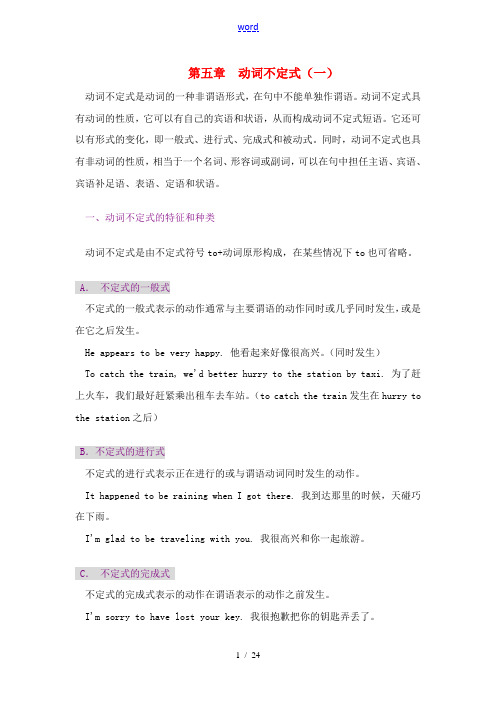
第五章动词不定式(一)动词不定式是动词的一种非谓语形式,在句中不能单独作谓语。
动词不定式具有动词的性质,它可以有自己的宾语和状语,从而构成动词不定式短语。
它还可以有形式的变化,即一般式、进行式、完成式和被动式。
同时,动词不定式也具有非动词的性质,相当于一个名词、形容词或副词,可以在句中担任主语、宾语、宾语补足语、表语、定语和状语。
一、动词不定式的特征和种类动词不定式是由不定式符号to+动词原形构成,在某些情况下to也可省略。
A.不定式的一般式不定式的一般式表示的动作通常与主要谓语的动作同时或几乎同时发生,或是在它之后发生。
He appears to be very happy. 他看起来好像很高兴。
(同时发生)To catch the train, we'd better hurry to the station by taxi. 为了赶上火车,我们最好赶紧乘出租车去车站。
(to catch the train发生在hurry to the station之后)B.不定式的进行式不定式的进行式表示正在进行的或与谓语动词同时发生的动作。
It happened to be raining when I got there. 我到达那里的时候,天碰巧在下雨。
I'm glad to be traveling with you. 我很高兴和你一起旅游。
C.不定式的完成式不定式的完成式表示的动作在谓语表示的动作之前发生。
I'm sorry to have lost your key. 我很抱歉把你的钥匙弄丢了。
I meant to have finished my work last night, but I didn't feel very well. 我本来想昨晚完成工作的,但是我感觉身体不舒服。
It has been an honor for me to have been invited to your country. 对我来说,被邀请来你们国家是一件很荣幸的事情。


《外研版》动词不定式语法专项教学设计学生年级:初中二年级教学内容:动词不定式用法一、教学内容分析动词不定式做主语、定语及状语结构在Module 9已有涉足,可通过复习回顾加深学生的印象,本课进一步学习动词不定式做宾语的用法。
在教学过程中利用语言材料充分展开说、读、写训练,帮助学生掌握动词不定式的基本结构,并在实际运用中体会和领悟动词不定式的表意功能。
二、教学理念设计根据新课标,把“激发和培养学生的学习兴趣,树立信心,形成有效的学习策略”作为首位的教学目标,通过课堂活动将枯燥的语法学习融入到学生感兴趣的现实生活中去,使学生能在情境中练,在练中熟,在活动中运用掌握,加强了语言实践,提高了学生对英语语言实际运用的能力。
1、注重语法练习情景化:本课应以语法实践为主,语法知识介绍为辅,强调通过实践掌握语法规则,把语法融入具体语境中进行练习。
2、面向全体学生,为学生提供交流和展示自己的机会。
三、教学目标1.知识目标:1)能够正确使用下列短语:offer to do, agree to do, plan to do, decide to do, hope to do, want to do, would like to do2)能够掌握动词不定式做宾语的表意功能。
2.技能目标:1)感知动词不定式做宾语的用法,并能用这一结构准确表达。
2)能够用动词不定式描述生活中的一件事。
3.情感态度1)培养学生在小组活动中积极与他人合作交流,相互帮助,共同完成任务,并能从合作中获得快乐。
2)引导学生在生活中接触英语时,乐于探究其含义并尝试模仿。
四、教学重点与难点重点:掌握动词不定式做宾语的表意功能难点:能够在实际运用中正确掌握动词不定式的表意功能并进行交流。
五、学习者特征分析1.学生是初中二年级的学生2.学生在初一阶段接触过want to do ,decide to do 这一类词组,对于动词不定式有了初步的了解。
3.这个年龄段的学生们思维活跃,乐于表达自己,渴望得到老师的赞许。
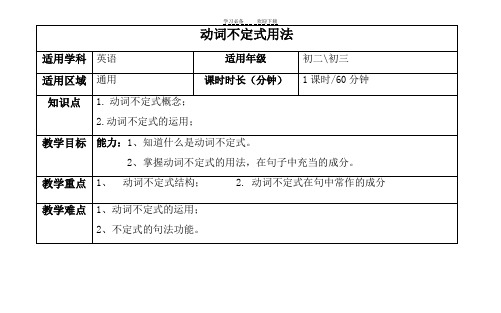
教学过程一、课堂导入老师将下列句子呈现给学生,学生跟着老师读下列句子,找出to do,思考其作用。
1. It is necessary to remember enough words.= To remember enough words is necessary.记住足量的单词是有必要的。
2. I find it hard to get along with him.我发现与他相处不是件容易的事。
二、复习预习教师引导学生复习上节课所学的反意疑问句的概念,用法,以及特殊句型的反意疑问句。
(以提问、回顾的形式进行),针对上节课的作业进行讲评、订正、答疑,并通过反意疑问句的具体用法的分析和扩展导入本节课所要学习的不定式的分类,不定式在句中充当的成分等知识点。
三、知识讲解知识点1:动词不定式的概念1.动词不定式是动词的一种非谓语形式,又叫非谓语动词,它没有人称和数的变化,在句子中不能做谓语;它由“to+动词原形”构成,这里的to是动词不定式符号,本身没有词义,其否定形式常在to前加not;2.动词不定式仍保留动词的特点,即可以有自己的宾语和状语。
动词不定式同它的宾语或状语构成不定式短语。
3.动词不定式具有名词、形容词和副词的特征,因此在句子中可以作主语、宾语、表语、宾语补足语、定语和状语。
知识点2:动词不定式的用法1. 【考查点】动词不定式作主语动词不定式作主语时,为避免句子的头重脚轻,常用it作为形式主语,而真正的主语动词不定式后置。
如要说明动作的执行者,可在不定式前加for引导的短语;但如果表语是nice, kind, clever等描述动作执行者的性格、品质的形容词时,则应在不定式前加of引导的短语。
常用句型:It +be+adj./n.+(for/of sb.) to do sth./It takes sb. some time to do sth.如:It is difficult for me to learn math well.It takes me one hour to get home from school.动词不定式作后置定语时,与被修饰的名词逻辑上有动宾关系。

初中英语语法精讲动词不定式用法(教案)一、教学目标:1. 让学生掌握动词不定式的概念及基本用法。
2. 培养学生正确运用动词不定式表达目的、结果、原因等状语从句。
3. 提高学生听说读写能力,增强实际交际中的运用能力。
二、教学内容:1. 动词不定式的定义及构成。
2. 动词不定式的基本用法:作状语、作宾语、作主语。
3. 动词不定式在特定句型中的用法:目的状语、结果状语、原因状语。
4. 动词不定式的否定式及疑问式的构成及用法。
5. 动词不定式与它所修饰的词的词义关系。
三、教学重点与难点:1. 重点:动词不定式的基本用法及在特定句型中的表达。
2. 难点:动词不定式否定式及疑问式的构成及用法。
四、教学方法:1. 实例分析法:通过大量例句分析,让学生深入了解动词不定式的用法。
2. 互动教学法:鼓励学生积极参与,提高课堂氛围,增强实际交际能力。
3. 练习巩固法:通过课后练习,检查学生对所学知识的掌握程度。
五、教学步骤:1. 引入:以一段对话或故事引出动词不定式的概念,激发学生兴趣。
2. 讲解:讲解动词不定式的定义、构成及基本用法。
3. 示范:用多个例句展示动词不定式在句子中的不同作用。
4. 练习:让学生用动词不定式完成句子,体会其用法。
5. 拓展:讲解动词不定式在特定句型中的用法,如目的状语、结果状语、原因状语。
6. 互动:分组讨论,让学生用动词不定式造句,相互交流。
7. 总结:对本节课的主要内容进行总结,强调重点和难点。
8. 作业:布置课后练习,让学生巩固所学知识。
六、教学评估:1. 课堂参与度:观察学生在课堂上的积极参与程度,提问和回答问题的积极性。
2. 练习完成情况:检查学生课后练习的完成情况,评估他们对动词不定式用法的掌握程度。
3. 小组讨论:评估学生在小组讨论中的表现,包括合作态度和创造性运用动词不定式的能力。
七、课后作业:1. 抄写课堂上的例句,并用自己的话造句,运用动词不定式。
2. 编写一篇小短文,尽可能多地使用动词不定式。
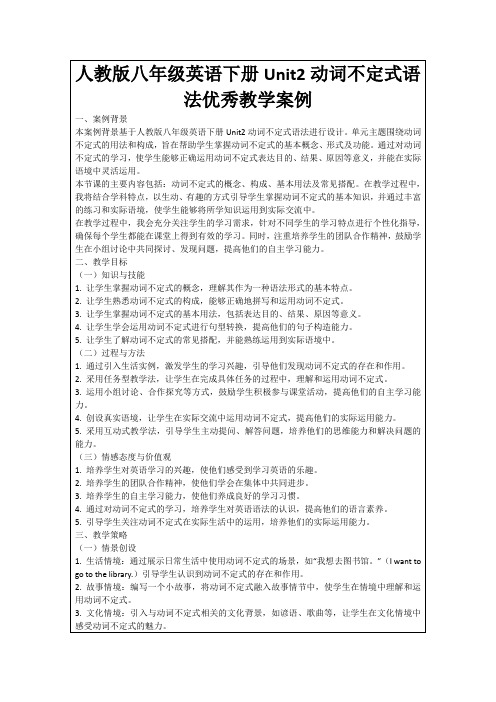
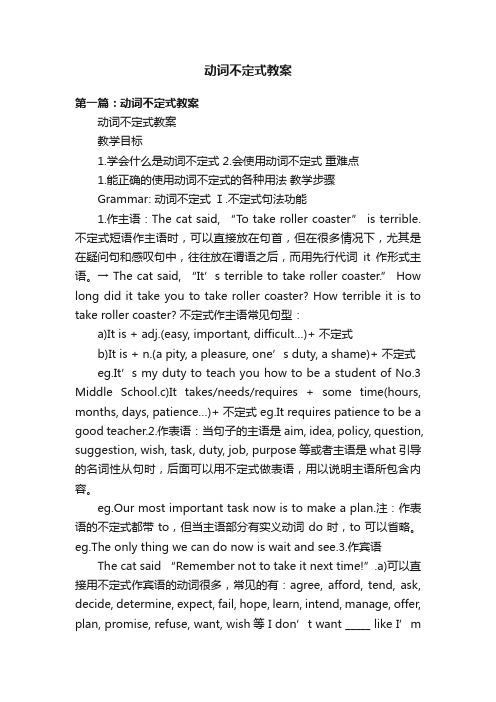
动词不定式教案第一篇:动词不定式教案动词不定式教案教学目标1.学会什么是动词不定式2.会使用动词不定式重难点1.能正确的使用动词不定式的各种用法教学步骤Grammar: 动词不定式Ⅰ.不定式句法功能1.作主语:The cat said, “To take roller coaster” is terrible.不定式短语作主语时,可以直接放在句首,但在很多情况下,尤其是在疑问句和感叹句中,往往放在谓语之后,而用先行代词it作形式主语。
→ The cat said, “It’s terrible to take roller coaster.” How long did it take you to take roller coaster? How terrible it is to take roller coaster? 不定式作主语常见句型:a)It is + adj.(easy, important, d ifficult…)+ 不定式b)It is + n.(a pity, a pleasure, one’s duty, a shame)+ 不定式eg.It’s my duty to teach you how to be a student of No.3 Middle School.c)It takes/needs/requires + some time(hours, months, days, patience…)+ 不定式 eg.It requires patience to be a good teacher.2.作表语:当句子的主语是aim, idea, policy, question, suggestion, wish, task, duty, job, purpose等或者主语是what引导的名词性从句时,后面可以用不定式做表语,用以说明主语所包含内容。
eg.Our most important task now is to make a plan.注:作表语的不定式都带to,但当主语部分有实义动词do时,to可以省略。

一、课堂导入To do sth. 这是一个见得很多,说的很多,用的很多,也错的很多的话题。
很多人都知道它叫做不定式,那她是怎么构成的?每一部分有什么含义?又怎么使用呢?就让我们一起来看看吧!二、本周回顾动词不定式用法1.英语动词的非谓语形式为三种:__________; _________; _________。
非谓语动词没有人称和数的变化。
2.动词不定式构成:to+V(原形),其中to不是介词,而是动词不定式的符号,称为小品词,动词不定式没有人称和数的变化。
3.不定式在句子中可以用作主语、表语、宾语、补足语、定语、状语等。
1) 作主语例如:To be a doctor is hard. 做医生很难。
To learn English well is not easy. 学好英语不容易。
To say is to believe.眼见为实。
※动词不定式(短语)作主语时,为了避免句子的头重脚轻,可以用“it”作形式主语,而把真正的主语It is hard to be a doctor.It is not easy to learn English well.It’s important to plant trees in spring.2).作表语:His work is to drive a car. 他的工作是开车。
My job is to feed animals. 我的工作是饲养动物。
3). 作宾语动词不定式(短语)可以放在一些动词后面用作宾语,能以动词不定式作宾语的动词有:begin, start, want, forget, remember, show, learn, like, hate, love, ask等。
例:I want to tell you a story.They begin to work at eight every morning.*如果and连接两个动词不定式,第二个动词不定式一般省“to”例:(1)He wants to go and have a swim with us. 他想和我们一起去游泳(2)若作宾语的动词不定式(短语)很长,可用it作形式宾语。
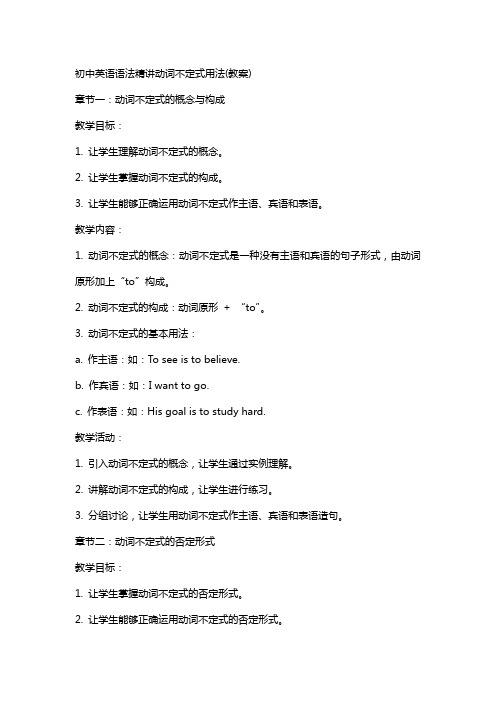
初中英语语法精讲动词不定式用法(教案)章节一:动词不定式的概念与构成教学目标:1. 让学生理解动词不定式的概念。
2. 让学生掌握动词不定式的构成。
3. 让学生能够正确运用动词不定式作主语、宾语和表语。
教学内容:1. 动词不定式的概念:动词不定式是一种没有主语和宾语的句子形式,由动词原形加上“to”构成。
2. 动词不定式的构成:动词原形+ “to”。
3. 动词不定式的基本用法:a. 作主语:如:To see is to believe.b. 作宾语:如:I want to go.c. 作表语:如:His goal is to study hard.教学活动:1. 引入动词不定式的概念,让学生通过实例理解。
2. 讲解动词不定式的构成,让学生进行练习。
3. 分组讨论,让学生用动词不定式作主语、宾语和表语造句。
章节二:动词不定式的否定形式教学目标:1. 让学生掌握动词不定式的否定形式。
2. 让学生能够正确运用动词不定式的否定形式。
1. 动词不定式的否定形式:在“to”前面加上“not”,即“not to”。
2. 动词不定式的否定形式的用法:表示否定意义,如:I don't want to go.教学活动:1. 讲解动词不定式的否定形式,让学生进行练习。
2. 小组活动,让学生用动词不定式的否定形式造句。
章节三:动词不定式的疑问形式教学目标:1. 让学生掌握动词不定式的疑问形式。
2. 让学生能够正确运用动词不定式的疑问形式。
教学内容:1. 动词不定式的疑问形式:在“to”前面加上“do/does/did”,如:Do you want to go?2. 动词不定式的疑问形式的用法:用于提问,如:Do you want to go shopping?教学活动:1. 讲解动词不定式的疑问形式,让学生进行练习。
2. 小组活动,让学生用动词不定式的疑问形式提问。
章节四:动词不定式作主语教学目标:1. 让学生掌握动词不定式作主语的用法。
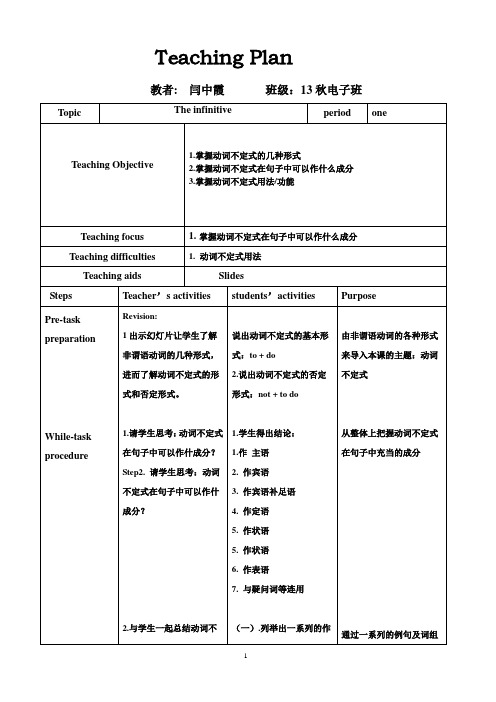

龙文教育教师1对1个性化教案学生姓名王私卉教师姓名万智华授课日期年月日授课时段课题非谓语动词之三——动词不定式教学目标动词不定式教学步骤及教学内容教学过程:一、教学衔接(课前环节)1、上节课练习讲解2、捕捉学生的思想动态和了解学生学习内容二、教学内容一、不定式的作用1、作主语2、作定语3、作表语4、作宾语5、作宾语补足语6、独立结构二、不定式的时态与语态1、时态:现在时、完成时、进行时、完成进行时2、语态三、省掉to的不定式九种不同的情况不定式的否定形式三、知识总结知识、方法·技能四、知识的延伸和拓展(变式训练)五、布置作业教导处签字:日期:年月日六、目标完成情况0~30% 〇 31%~50% 〇 51%~75% 〇76%~80% 〇 81%~90% 〇 91%~100% 〇教学过程中学生易错点归类作业布置学习过程评价学生对于本次课的评价O 特别满意 O 满意 O 一般 O 差教师评定学生上次作业评价O好 O较好 O 一般 O差学生本次上课情况评价O 好 O 较好 O 一般 O 差家长意见家长签名:非谓语动词之三——动词不定式一、不定式的作用1、作主语不定式作主语时,谓语用单数。
往往用it 作形式主语,把不定式放在谓语后面。
如:It took us two hours to finish the job.It is impossible for us to get there on time.It is very kind of you to help us.注意:(1)其他系动词如look, appear等也可用于此句型。
(2)当不定式作主语的句子中又有一个不定式作表语时,不能用It is …to…的句型。
试比较:It is to negate my own idea to believe him.To believe him is to negate my own idea .(3)It is+ adj. of / for sb. to do sth. 结构中,当不定式的逻辑主语和前面的形容词可以构成系表结构时,用of, 否则用 for.2、作宾语(1)动词+不定式。
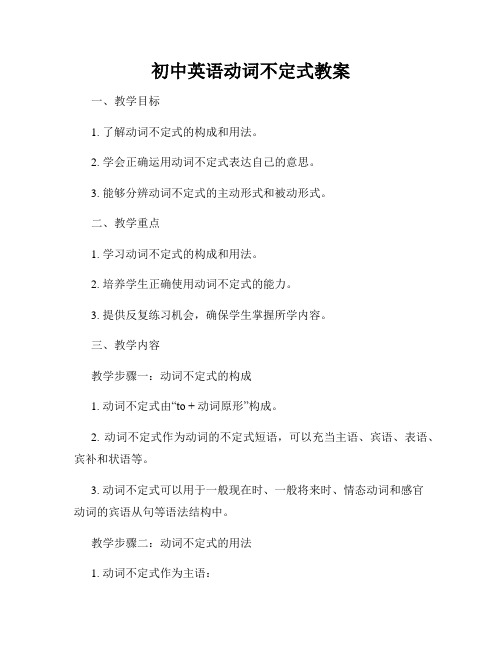
初中英语动词不定式教案一、教学目标1. 了解动词不定式的构成和用法。
2. 学会正确运用动词不定式表达自己的意思。
3. 能够分辨动词不定式的主动形式和被动形式。
二、教学重点1. 学习动词不定式的构成和用法。
2. 培养学生正确使用动词不定式的能力。
3. 提供反复练习机会,确保学生掌握所学内容。
三、教学内容教学步骤一:动词不定式的构成1. 动词不定式由“to + 动词原形”构成。
2. 动词不定式作为动词的不定式短语,可以充当主语、宾语、表语、宾补和状语等。
3. 动词不定式可以用于一般现在时、一般将来时、情态动词和感官动词的宾语从句等语法结构中。
教学步骤二:动词不定式的用法1. 动词不定式作为主语:a) It is important to learn English well.b) To be happy is what we all want.2. 动词不定式作为宾语:a) I want to go to the park.b) She likes to play basketball.3. 动词不定式作为表语:a) His dream is to become a doctor.b) The most important thing is to be confident.4. 动词不定式作为宾补:a) I saw him go into the building.b) He heard her sing a beautiful song.5. 动词不定式作为状语:a) She practiced every day to improve her skills.b) He came early to catch the first bus.教学步骤三:动词不定式的被动形式1. 动词不定式的被动形式为“to be + 动词的过去分词”。
2. 动词不定式的被动形式可用于被动语态、情态动词的被动语态和被感官动词的宾语从句中。

动词不定式作主语的用法教案一、结构:二、用法:1.动词不定式作主语时,往往位于句首,其后跟随一个谓语动词。
例句:To study hard is essential for success.翻译:努力学习对成功至关重要。
2. 动词不定式作主语可以与一些形容词连用,常见的形容词包括:necessary, important, easy, difficult, good, bad, possible等。
例句:It is important to protect the environment.翻译:保护环境是重要的。
3. 动词不定式作主语时,可以使用it作形式主语,将动词不定式放在句子后面,使句子结构更加清晰。
例句:It is important to eat healthily.翻译:健康饮食是重要的。
4.动词不定式作主语时,需要注意主谓一致的问题,即根据动词不定式的主语来确定动词的单复数形式。
例句:To travel around the world is my dream.翻译:环游世界是我的梦想。
三、练习题:1. ___________ (To learn) a new language can be challenging but rewarding.2. ___________ (To exercise) regularly is good for your health.3. ___________ (To speak) English fluently is necessary for my job.4.___________(To read) novels before sleep helps me relax.答案:1. Learning2. Exercising3. Speaking。

初中英语动词不定式的基本用法动词不定式(the infinitive)的基本用法动词不定式1. “not/never to do / not do”.2. 基本用法:不定式可以带宾语或状语构成不定式短语,没有人称和数的变化。
一、不定式的句法功能1. 作主语eg: I t’s very common to raise money in Canadian and American school.不定式做主语时,常用代词it 来代替不定式结构, 这时 it 被称为形式主语,而作为句子真正主语的不定式则被后置,往往放v.和adj.之后。
e.g. To learn English well is not easy.= It’s not easy to learn English well.★不定式的逻辑主语有时用“of/for + 名词或代词宾格”构成, 即:跟踪练习1. It’s very nice of them ________ (send) me the flowers.2. _________ (become) a teacher is my dream.3. It’s very important to learn English well.(同义句转换)________ ________ English well ______ very important.4. It’s important _______ Chinese well.A. to learnB. learnC. learningD. learns2. 作表语eg:The best way to raise money is to sell newspapers.表语是用来表示主语的身份、状态和特征等,可与系动词构成系表结构。
eg:Her wish is to study in Ji Yan Middle school.My job is to clean the streets.跟踪练习1. My work is __________ (clean) the room every day.2. His dream is _________ (be) a doctor.3. 作宾语eg:The driver offered to help the patient.有些动词后只能用不定式作宾语,表示命令、打算或希望等。
动词不定式用法与专项练习动词不定式: to+do (高二2016.2)动词不定式由“to + 动词原形”组成,是动词的一种非谓语形式。
动词不定式在句中可充当主语、表语、宾语、定语、状语、宾补、主补。
1. 动词不定式在句中的语法功能:(1)动词不定式(短语)作主语To love is to be loved. 爱别人就是被人爱。
To teach is to give. 教书就是奉献。
*to do和v-ing作主语时的区别:Smoking is a bad habit. (v-ing作主语表示习惯性动作)To stay home on such a cold night is comfortable. (动词不定式作主语表示偶然性或一次性的动作)*不定式作主语和目的状语时的区别。
例如:To get up early does good to one’s health.早起对身体有好处。
(作主语)To get up early, one must go to bed early.为了早起,必须早睡。
(作目的状语)(2) 动词不定式(短语)作宾语I will leave it to you to make the final decision. 我将由你来做最后的决定。
(it作形式宾语) She decided to quit her job at last. 最后,她决定辞职。
*"疑问词 + 动词不定式短语"作宾语:I don't know what to do. 我不知道该怎么办。
The children are learning how to play the game. 孩子们在学做游戏。
例如(NMET2000):I’ve worked wi th children before, so I know what ____ in my new job.A. expectedB. to expectC. to be expectingD. expects (答案:B)(what to expect在句中作know的宾语,而what作不定式to expect的逻辑宾语。
)(四川09) He told us whether _______ a picnic was still under discussion.A. to haveB. havingC. haveD. had (答案: A)又如:It is said that in Australia there is more land than the government knows ____.A. it what to do withB. what to do it withC. what to do with itD. to do what with it答案是C。
what to do with it作knows的宾语。
*注意:有些动词后面必须跟动名词作宾语,平时要注意区别,进行区分。
*forget, remember, try, regret, mean, stop等动词后既可跟不定式又可跟动名词,须根据其习惯用法和语境进行取舍。
例如(MET91):— The light in the office is still on.— Oh, I forgot____.A. turning it offB. turn it offC. to turn it offD. having turned it off答案是C。
forget to do意为“忘了做(某事)”,forget doing“忘了做过(某事)”;remember有类似的区别。
类似的还有:try to do“尽力做”,try doing“试着做”;regret to say /tell“很遗憾地说”,regret doing“后悔做了……”;mean to do“意欲/ 想要做”,mean doing“意味着做”;stop to do“停下来做另外的事情”,stop doing“停止正在做的事情”。
(3)动词不定式(短语)作表语The most important thing for the United States to do now is to rescue the wounded.现在,对美国来说,最重要的是抢救伤员。
*注意:在“形容词 + 不定式”结构作表语、宾补和定语时,其中形容词多为表示性质的词,如:easy, hard, good, difficult, interesting等,常常是主动式表被动。
例如:These apples are good to eat. 这些苹果很好吃。
(作表语)I find it difficult to understand. 我发现这很难懂。
(作宾补)He is a man easy to get on with. 他是一个容易相处的人。
(作定语)The box is light enough to carry. 这盒子轻得可带走。
(作表语)The future is hard to tell. 未来很难预测。
(作表语)*注意:All you have to do is (to) finish the job quickly. 如果主语部分有个表示不定式内容的 do, 用作表语的不定式可省略 to。
又如:We had nothing to do but _______ (watch) TV yesterday. (答案: watch)We did nothing but ________ (watch) TV yesterday. (答案: watch)(4) 动词不定式(短语)作宾语补足语。
She asked me to stay here. She encouraged me to work hard.We'd love you to give us a hand. 我们想让你帮个忙。
注意:1)在一些动词后,用作宾语补语的动词不定式符号to 要省略掉。
这类动词包括感官动词以及使役动词,如feel, spot, look at, listen to, observe, see, hear, watch, notice, have, make, let, get 等。
但如果句子为被动语态,动词不定式(短语)为主补时,要带to。
I had John fix my bike. 我让约翰修理我的自行车。
They saw the boy fall suddenly from the tree.-----The boy was seen to fall suddenly from the tree.Paul doesn’t have to be made___________ . He always works hard. (答案:B)A. learnB. to learnC. learnedD. learning辨析:I heard her sing a song in the next room yesterday. (强调听歌的整个过程)(=She was heard to sing a song in the next room yesterday.)I heard her sinning a song when I passed by.(强调动作正在发生)(=She was heard singing a song when I passed by.)*see, hear, notice等的宾语后还可跟现在分词作补语,变成被动语态时仍保留分词的形式,表示正在发生的动作。
例如:The missing boys were last seen ____ near the river. (答案:A)A. playingB. to be playingC. playD. to play(5)动词不定式(短语)作定语:动词不定式(短语)作定语需后置。
*动词不定式作定语与分词作定语的区别:过去分词表示动作已经完成,现在分词表示动作正在发生当中,而不定式则表示将要发生的动作或状态。
辨析: The meeting held is important. (表示动作已经完成)The meeting being held is important. (表示动作正在进行当中)The meeting to be held is important. (表示动作将要发生)注意:1)当被修饰的是不定代词如everything, anything, much, little等,或被修饰的名词前被形容词最高级,序数词,the only等强调结构修饰时,非谓语动词作定语则用动词不定式。
Do you have anything to say? 你有什么要说的吗?I am afraid I cannot attend your party, for I have too many things to do.He is the only person to know the truth. 他是唯一了解真相的人。
When the question was out, he was the first one to raise his hand….他第一个举起手。
He was the last to realize the importance of this problem.2)如被修饰的名词或代词是动词不定式的逻辑宾语,且动词不定式的动词是不及物动词,则后面需跟成为搭配的介词。
Who is the man to talk to? 要谈话的人是谁?He is a tough teacher to deal with. 他是个很难对付的老师。
I need a pen to write with. 我需要一支笔写字例如:To fetch water before breakfast seemed to me a rule_____.(上海高考题98):A. to never breakB. never to be brokenC. never to have brokenD. never to be breaking 答案是B,在句中作定语;由于a rule是不定式的逻辑宾语,所以不定式用了被动结构。
又如:There are five pairs____, but I’m at a loss which to buy.(上海高考题99)A. to be chosenB. to choose fromC. to chooseD. for choosing答案是B,这是“不定式 + 介词”作定语。